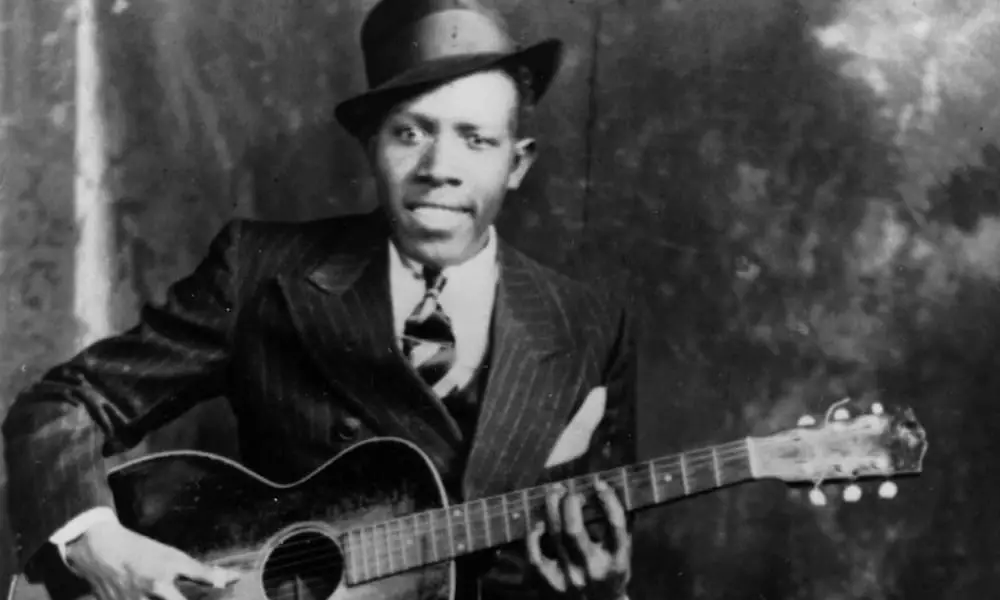After a few too many, you ask your friends, “Who’s the best guitar player in the world?” If they don’t reply with, “me” they’ll choose from the ever-growing myriad of great guitarists. Jimmy Page, Steve Vai, Eric Clapton, Django Reinhardt, Keith Richards, Muddy Waters, Joni Mitchell, Jimi Hendrix, Josh Homme, the list goes on. You both argue until you’re blue in the face, but after the fighting has stopped, you both concede that “maybe we’re both right.” Alternatively, you pack your bags and decide you didn’t really like that person to begin with.
Music is subjective. We all have an idea of who carries the mantle of the best. I’m not made of stone, I have my favorite too. But objectively, when I think of the best, I look to where it all began — to who inspired the inspirers. The music that crops is the blues. And the name that crops up is one of the most prolific architects of the blues, Robert Johnson.
Who Was Robert Johnson?
The story of Robert Johnson is shrouded in myth. The legend has it that he went down to the crossroads to sell his soul to the devil. In return, the devil gave him extraordinary mastery over the guitar. Of course, this is all very far-fetched, but it was at least a testament to his abilities.
The truth, as always, is a little more mundane. Robert Johnson was a budding blues musician around the 1930s in and around Mississippi. Among the early delta blues musicians like Son House, Big Joe Williams, and Charley Patton, the competition was stiff. The blues was experiencing a wave of musicians pouring out their heart with just a guitar and a voice.
Initially, Robert Johnson was by all accounts just another forgettable guitar player. Having little success on his own, he teamed up with fellow bluesman, Ike Zimmerman, who taught him how to play… properly. The two would allegedly practice in graveyards, though again, this is considered to be a part of the myth. After a year or so, Johnson reappeared on the scene with nigh supernatural musical abilities. He had been transformed into one of the best blues musicians of all time.
Johnson quickly caught the attention of talent scouts, but because he died at the early age of 27, he only recorded 29 songs during his lifetime. Even Johnson’s death was shrouded in myth. He allegedly died of syphilis, though some say he was poisoned by a jealous husband after Johnson flirted with the man’s wife. What we do know is that despite his brief tenure as a musician, his legacy went on to affect music in an unalterable way.
Why Was Robert Johnson And The Blues So Important?
The blues is at the heart of popular music. The traditional 12 bar blues chord progression of I IV V, or to put in context in the key of E, E to A to B, is the core of popular music. When the blues gathered steam, this chord progression was transposed to rock and roll, which went on to inspire ’60s musicians, and they inspired the ’70s and so on. Even today, a large amount of pop music generally follows the I IV V progression, but it all began with the blues.
As an inimitable blues guitarist, Robert Johnson became the daddy of the genre. Of course, he wasn’t the only blues musician that helped popular music along the way, but he is one of the most notable. His music went on to be recorded again and again by the musicians he inspired. In the 1950s, his songs were played and revived by various rock and roll bands. Down the line, Johnson has been credited as a major influence from the likes of Eric Clapton, Keith Richards, Jimmy Page, Peter Green, Jack White, and many more. His songs were and are a staple in the repertoire of any blues band worth their salt.
Johnson inspired the inspirers. Without him music as we know it would be a little different indeed. Even if his music is a far cry away from rock music today, he was a key component of its development.
Why Was Johnson Such An Inspiration?
It wasn’t just the myth that surrounded Johnson’s life that attracted the would-be blues and early rock musicians, but also his consummate musical technique.
Man or octopus? Johnson was a one-man band! Rather than a bass, piano and lead guitar player, Johnson did it all himself on an acoustic guitar. Oh, and to top it off, he sang as well. Even basic rhythm is covered too with Johnson using his thumb to bash out the beat.
To mimic the boogie-woogie shuffle of what a piano would usually play, he used his thumb to keep the bass groove going on the low-notes of the guitar. This creates the foundation of the rhythm and bass.
For the most part, Johnson stuck to the typically 12 bar blues progression of the before mentioned I IV V sequence. Dominant 7 chords were a personal favorite of Johnson. So the rhythm guitar is centered on the I IV V, playing, for example, G7 to C7 then to D7. This is the easy part! On top of the chords, Johnson’s fingers plucked the melodies and lead parts that you’d expect from another guitar player!
Much of Johnson’s work was done in open-tunings. Rather than the standard tuning of E A D G B E (low to high), he often used open G tuning D G D G B D (low to high). This changes how chords are voiced because when you strum the open strings, they play the notes of the respective chord you’ve tuned it to. A standard E major chord won’t play like it would in standard tuning. It makes for interesting ways to play the guitar if you can wrap your head around the notes, all being in different places.
Johnson was a master of the slide, too (a piece of metal or glass that generally goes on your ring finger or pinkie). A slide captures that unmistakably blues sound! It’s played just over the strings to create a strong vibrato effect and used to slide up to notes.
In laymen’s terms, Johnson was a wizard. As delta blues guitarists go, he certainly wasn’t the first, but he was surely one of its masters. To say Johnson is the best guitar player in the world may not sit right with some — everyone has their own tastes. But what cannot be denied, is Johnson’s legacy, and the cosmic effect he had on music and the guitar.



